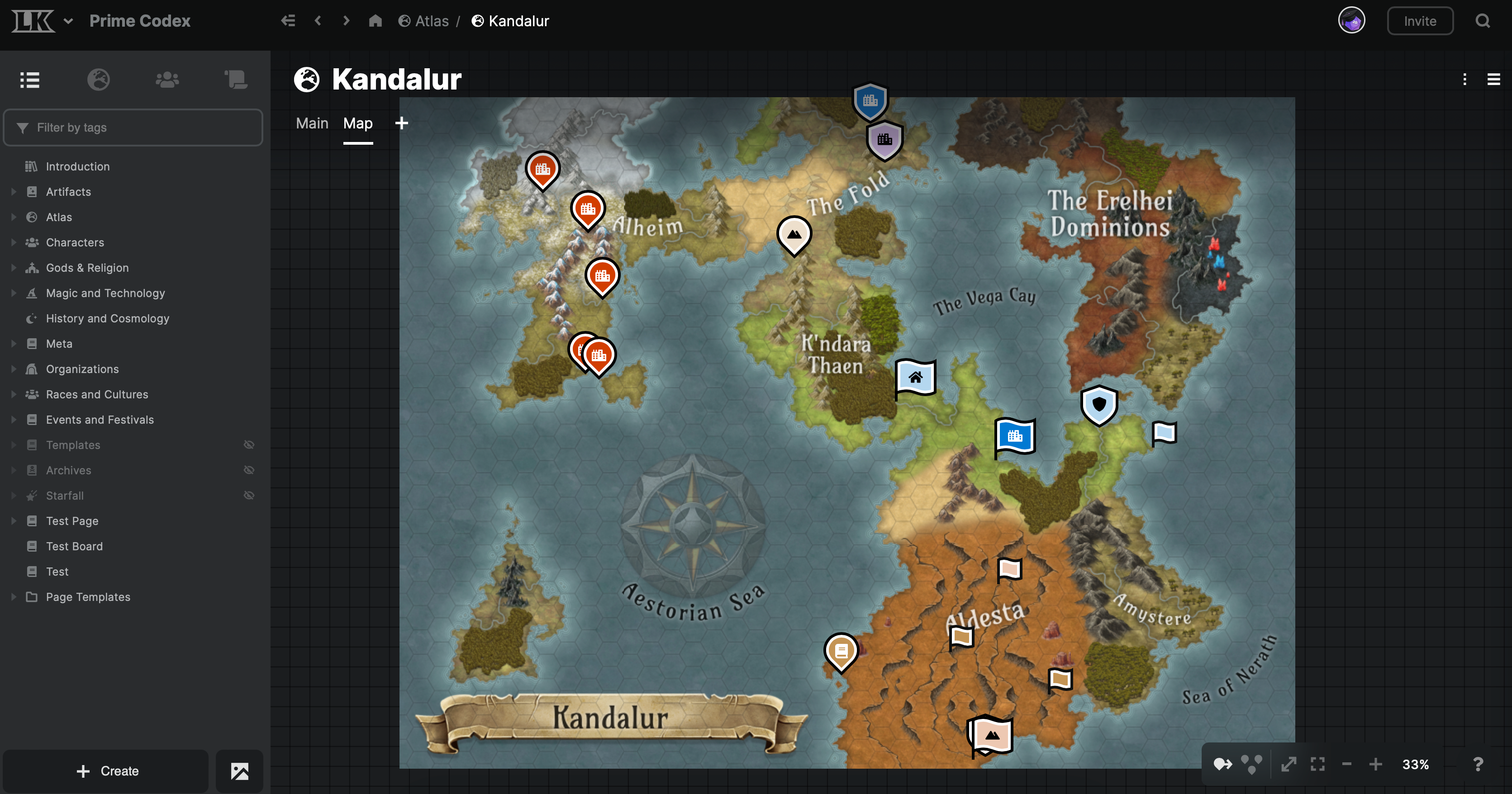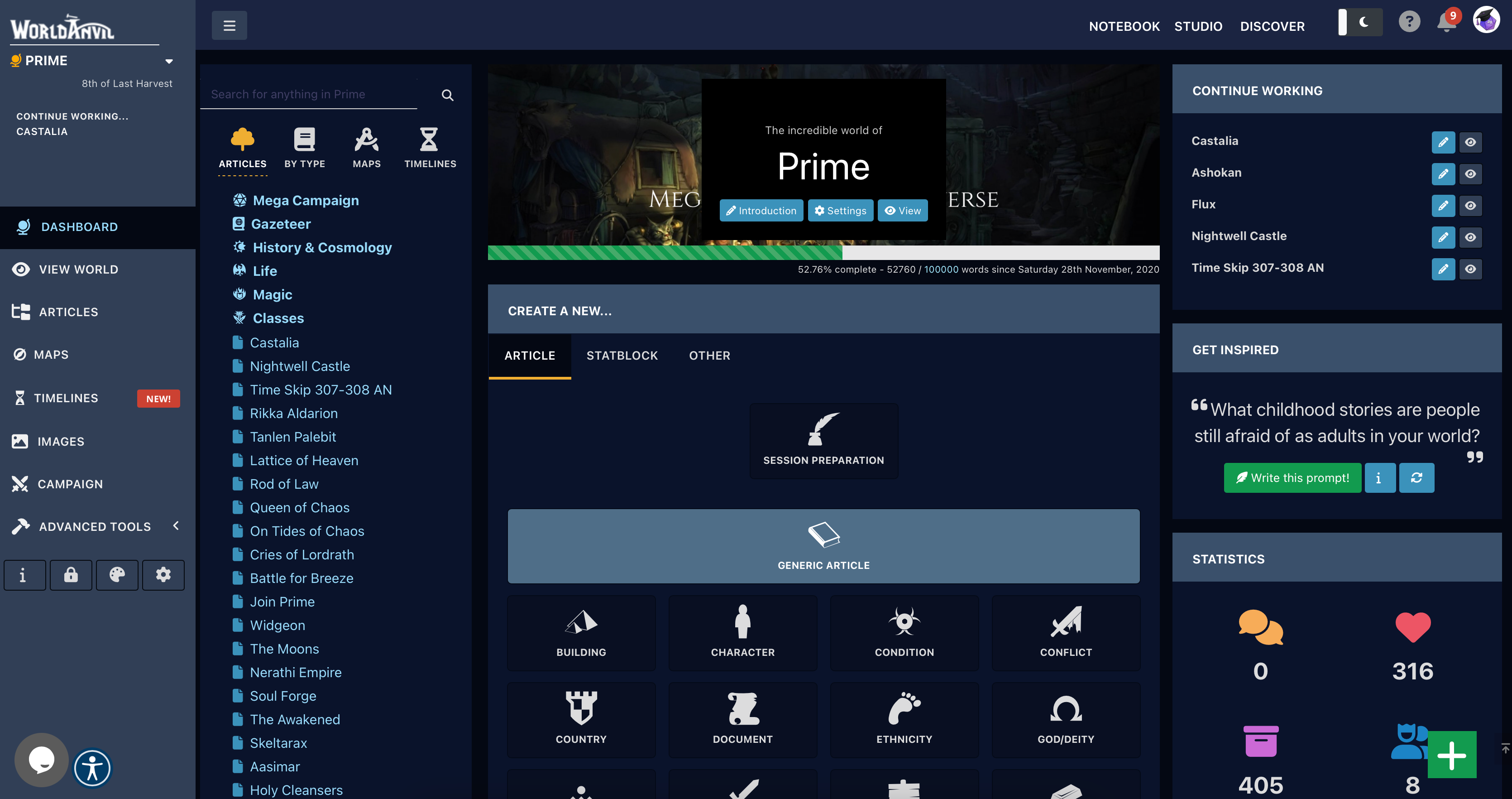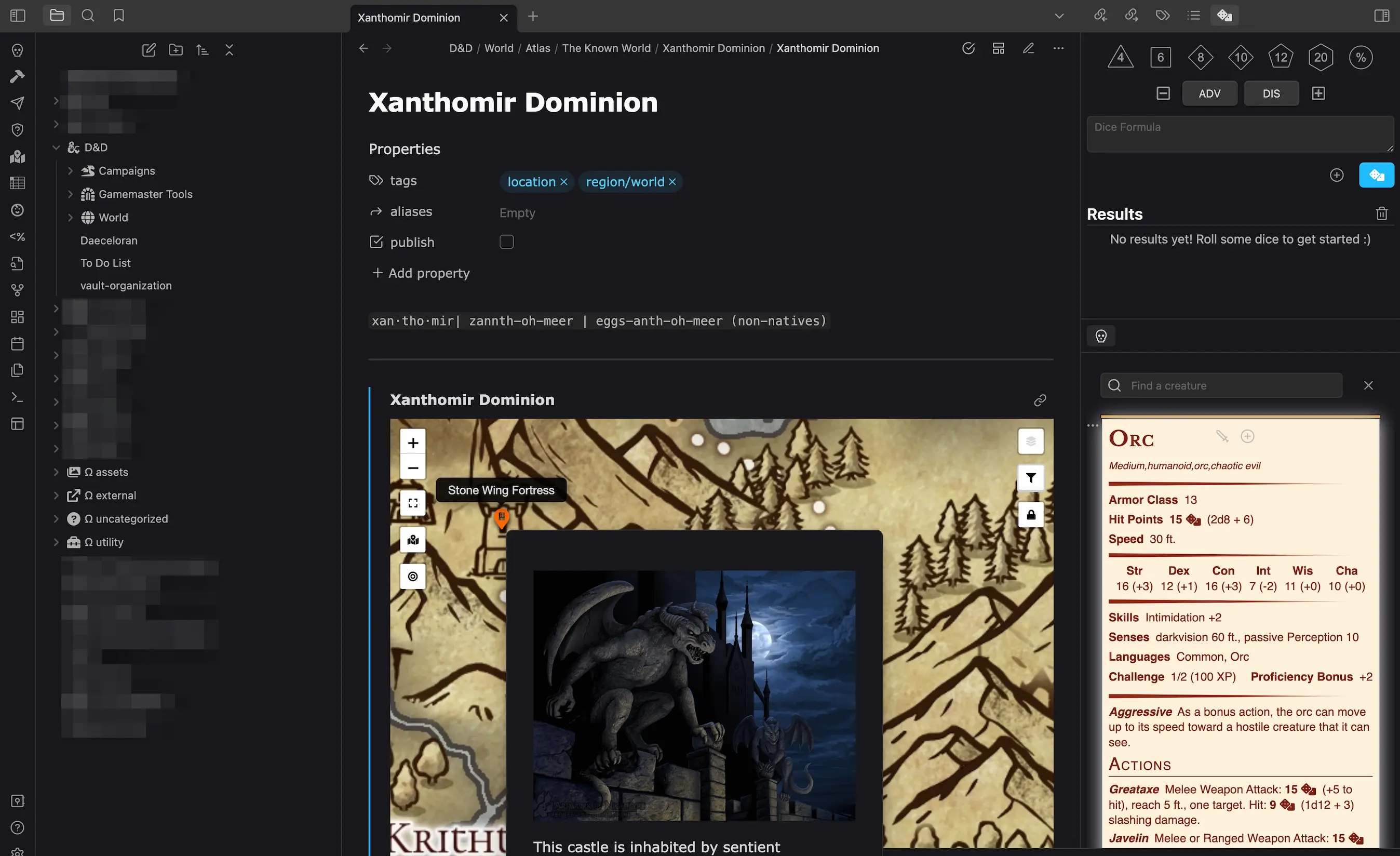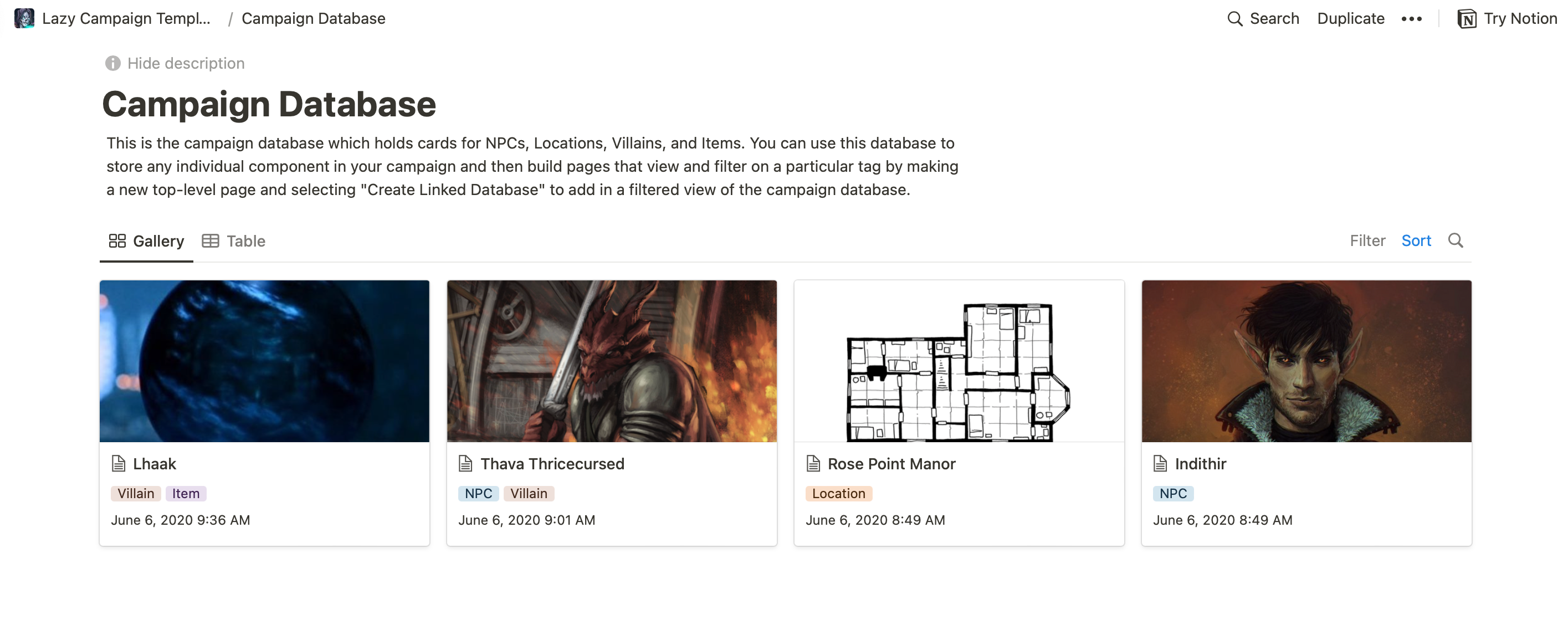The Ultimate Guide to TTRPG Campaign Managers in 2024
Get notified about new articles and receive downloads for PhD20's Adventure Design Document and Obsidian TTRPG Vault Template.
I’m fascinated by the opportunities that technology unlocks for tabletop roleplaying game campaign management. Nearly a decade ago, I kickstarted one of the best choices out there. But by 2016, few options (if any) were keeping up with technology. I ranted about it—twice. Since those rants, this micro-industry has taken off. Now we have an overwhelming number of options. Some options are built for TTRPGs. Some are not. So where do we start? Let’s dive into the features, strengths, and weaknesses of the best options available.
TTRPG Software
LegendKeeper

LegendKeeper is a modern web app that makes it easy to design, build, and share worlds for any kind of story.
LegendKeeper is a fast and flexible tools for worldbuilding and TTRPG campaign management. The tool is surrounded by a passionate founder and active community. The use of modern technologies under the hood make this app fast to use. I’d argue that no other program offers workflows this fast and easy to use. I’ve got an article to help you get started.
Key Features
- Simple and powerful editor with the
/menu - Intuitive mapping tools to drop pins and link to wiki content
- Linking through quick mentions or auto-linking for entire documents
- Built-in offline support
- Granular permissions to limit who can see content
Strengths
- Easy to use. LegendKeeper has almost no learning curve. Just open a document and start typing. The tools are easy to understand and feel familiar. Drag and drop to organize your wiki.
- Fast. LegendKeeper outperforms the TTRPG competitors when it comes to loading times and workflow speed. I’d attribute this to the founder embracing modern technologies and making performance a priority.
- Flexible. You’re in control of what documents contain and what templates you decide to create. You’re in control of how the wiki is organized.
Weaknesses
- Presentation. You can create columns, headings, tables, etc. But you can’t add custom styling like CSS or custom fonts. You’re left with the interface presented to you at the beginning.
Cost
LegendKeeper has a free 14-day trial to let you try it out. After that, it’s either $9/month or $90/year.
World Anvil

Write Articles to Detail and Keep Track of Everything in Your World. Create Your World. Manage Your Campaign. Plan Your Novel. Be a Hero. Worldbuilding Prompts. Master Your Campaign. Make Worlds Interactive. Wow your players. Be the best Gamemaster.
World Anvil is a gargantuan suite of tools for building worlds, managing RPG campaigns, and writing novels. You organize your content in wiki-like articles. Even better than their amazing product is the community around it. The passionate founders interact with the massive community through annual contests, weekly streams, and a bustling Discord server. No other programs out there come with more features out of the box. I’d even argue that no other program offers as rich of a way to present your world to an audience.
Key Features
- Organization with tags and categories
- Presentation using pre-made themes or custom styling
- Templates and worldbuilding prompts to drive creativity
- Permission tools to limit who can see specific content
- Mapping tools to add pins and layers tied to content
- Various ways to link content together
Strengths
- Presentation. You have plenty of tools at your disposal for complete control over how your information is shared and presented.
- Community. World Anvil boasts an amazing community. Explore other worlds, view in-depth guides, or become inspired by daily worldbuilding prompts. Participate in community events and writing challenges.
- Monetization. World Anvil’s Sage tier provides excellent tooling for monetizing your content.
Weaknesses
- Overwhelming UI/UX. A bit of feature bloat leads to so much going on for nearly every interface. Dozens, if not hundreds of buttons and options.
- Moderate Learning Curve. Though the guides are great, there’s a moderate learning curve to find the best workflows in World Anvil. Some pages load very slowly while other interfaces are quicker. Finding the right way to work can take some time.
Cost
World Anvil has a free tier to let you play with common features. Three paid tiers offer monthly and yearly subscriptions or a one-time “Lifetime Membership” payment. These tiers range from tools for novice writers to professionals looking to monetize content. At the time of writing, monthly paid memberships start as low as $7.
Honorable Mentions
- Adventurer’s Codex
- Chronica
- Fantasia Archive
- Kanka
- Obsidian Portal
- Scabard
- The Goblin’s Notebook
Non-TTRPG Software
Obsidian

A second brain, for you, forever. Obsidian is a powerful and extensible knowledge base that works on top of your local folder of plain text files.
Obsidian is a powerhouse for organizing notes. If you forced me to pick one option from this article, Obsidian wins by a mile. This knowledge base works from local files and features are extended by community-built plugins. There’s a strong TTRPG presence in the community and a handful of plugins that are designed for roleplaying games.
Key Features
- Community plugins
- Customizable workspace (appearance and features)
- Powerful linking system
- You own and control your data
- Active community
Strengths
- Performance. The app runs off of your local files so it’s lightning fast.
- Own your data. “Your notes live on your device, period. You can encrypt them or back them up however you want; it’s your decision, not ours.”
- Infinitely extensible. The community plugins are a gamechanger. Anyone can design and share features to extend Obsidian.
Weaknesses
- Sharing. Outside of the paid Publish feature, there aren’t great ways to share your content. Luckily for TTRPGs, you can use my Discord Share plugin to share things with your players 😉.
- Scaled learning curve. The basics of organizing and writing notes couldn’t be simpler. But with the more advanced features, you will need to read documentation or watch tutorials. For example, some of the plugins provide really powerful capabilities. But you won’t figure out how to use them without a little reading. I’ve got an article to help you get started.
Cost
Obsidian is free. You can add Sync (backup to access across devices) for $10/month or $96/year. Publish to a public website for $10/month or $96/year. Neither of these is required and free alternatives exist.
Notion

Too many tools? Too much chaos? With Notion, all your work is in one place. Get started for free. Better shared docs. Hassle-free wiki software. All your projects tracked. Infinite flexibility.
Notion is an awesome app to manage anything and works just as well to manage a TTRPG campaign. Everything fits into a database model with slick features for sharing and presenting different views of your data.
Key Features
- Database structure with views and filtering
- Content blocks for quick editing
- Easily publish to the web
- User-friendly interface
Strengths
- Easy to use. A well-designed interface organizes features that are easy to understand.
- Sharing. It’s easy to publish to the web and to restrict sharing to certain members (limit 10 on the free tier).
Weaknesses
- Difficult to reorganize. With the database structure, it can be difficult to blow things up and reorganize on the fly. Not a huge weakness but something to be aware of.
- Presentation. Notion looks nice but other than a banner image and icon, you can’t customize the look. You’re stuck with how they lay out individual notes.
Cost
You can do almost everything you need (in TTRPGs) for free. For $8/month you can invite more guests and get a 30-day page history.
Honorable Mentions
- Google Drive
- Microsoft OneNote
- Airtable
- Trello